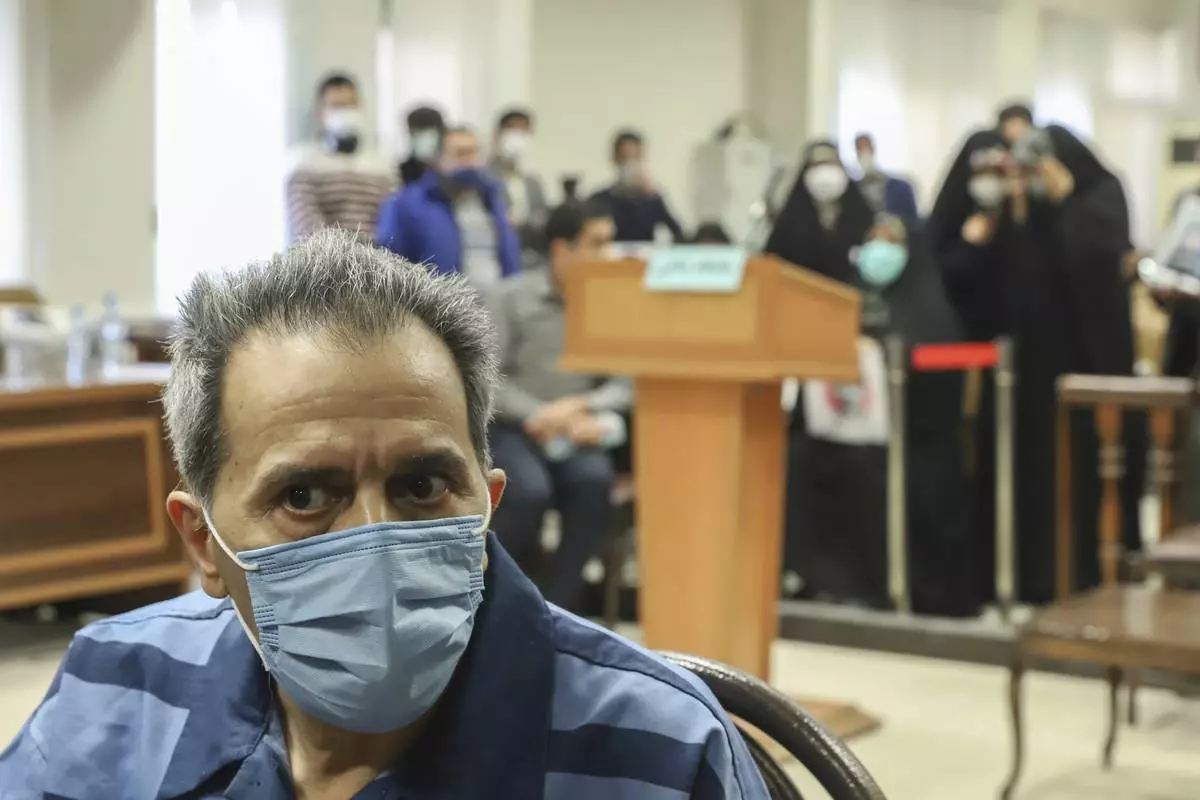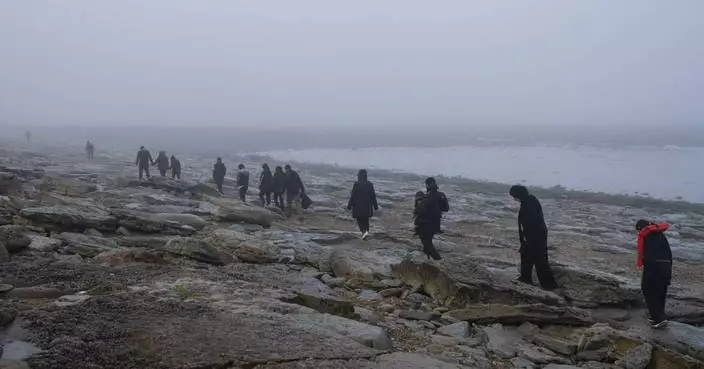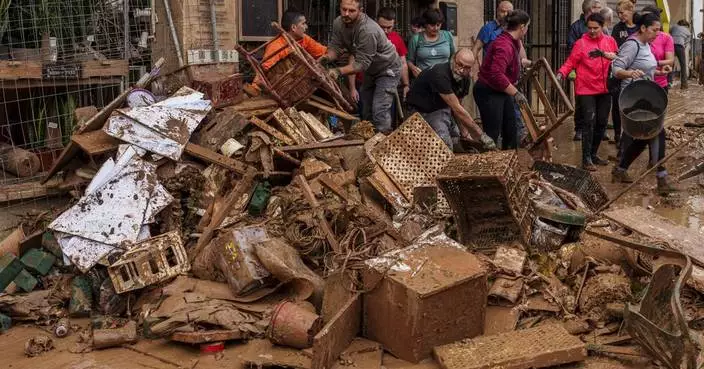PHNOM PENH, Cambodia (AP) — It’s tough being a reporter in Cambodia, whose government frowns on independent journalism that questions authority.
Veteran investigative reporter Mech Dara learned the hard way, when he was recently jailed on a felony charge for some items he had posted on Facebook.
Now he plans to be a farmer, he said Tuesday.
In a statement of support last month from Cambodian media organizations and civil society groups, Mech Dara was praised as “a front-line investigative journalist whose stories over the last decade have uncovered corruption, environmental destruction, and human trafficking at scam compounds across the country, and has consistently pushed for accountability and justice.”
But now out on bail, Mech Dara told The Associated Press he plans to leave the profession and grow vegetables in his hometown in Kandal province, just south of the capital Phnom Penh.
When not tending his crop, he might also sell coconuts or other items, he said.
Mech Dara recalled he spent 12 years working as journalist, for the Cambodia Daily and the Phnom Penh Post, two once-vibrant English-language newspapers forced to shut down under government pressure, and the Voice of Democracy radio and website, which was closed by the government last year. Now 36 years old, he had since then been working as a freelancer.
“In fact, I had been determined to keep working as a journalist for many years to come,” he said, “and to overcome all the obstacles I would meet."
But a few weeks spent in jail, with poor prospects of prevailing in court, changed his mind. Cambodia’s government has long been accused of using the judicial system to persecute critics and political opponents.
Mech Dara was arrested on Sept. 30 by a posse of military police at a toll booth as he was returning with his family to the capital Phnom Penh from a seaside holiday. The next day, he was formally charged with incitement to commit a felony or cause social disorder for items he posted online in late September. The offense carried a penalty of imprisonment for six months to two years, along with a fine.
Mech Dara said his initial, all-night interrogation was rough. He was in handcuffs and flanked by two policemen armed with AK-47 assault rifles as he was questioned. And they walked him up and down from the ground floor to the second floor, again and again, threatening him repeatedly.
Matters didn’t improve when he was sent to pre-trial detention at the Kandal provincial prison.
He neither slept nor ate well in the narrow, overcrowded cell where he was kept for more than three weeks. He said he saw prisoners slapping and punching each other and fainting, and heard of others dying. It made him wonder “whether or not I could see tomorrow and if the next day it could be me."
Adding to his concerns were his existing health problems, including Hepatitis B.
At the same time, he realized that the prospects of earning a living as a reporter were shrinking, especially because as a freelance journalist it was difficult to get licensed by the Information Ministry,.
His situation took a new turn on Oct. 23, when Fresh News, a pro-government media outlet, published a video of him in an orange prison uniform, apologizing to Prime Minister Hun Manet and former Prime Minister Hun Sen, who is now president of the Senate. Hun Manet succeeded his long-serving father as prime minister last year but so far has shown little more tolerance for criticism.
In a minute-long clip, Mech Dara stated he had posted five instances of false information in the past that were harmful to Cambodia and its leaders, and he promised not to post false information in the future.
The next day he was released on bail.
The most recent adjustment to his situation came on Monday, when Hun Manet on his Facebook page shared two photographs of him and Mech Dara, one in which they hugged each other, and another of them sitting face to face,.
Hun Manet said he had met Mech Dara and they talked about several topics, such as freedom of expression and the responsibility of journalists to publish true information, and to adhere to their professional code of ethics.
Mech Dara hasn’t posted anything on his Facebook page since his release.
——-
Associated Press writer Grant Peck reported from Bangkok.

FILE - Cambodian freelance journalist Mech Dara, who was released on bail waves from a car in front of the main provincial prison of Kendal Province, southern Phnom Penh, Cambodia, on Oct. 24, 2024. (AP Photo/Heng Sinith)
DUBAI, United Arab Emirates (AP) — An Iranian official claimed Tuesday that Iranian-German prisoner Jamshid Sharmahd died before Tehran could execute him — directly contradicting the country's earlier announcement he had been put to death.
The comment by Asghar Jahangir comes after Germany shut down all three Iranian consulates in the country over Sharmahd's death, leaving only the embassy in Berlin open. Germany later disputed Jahangir's remark.
Meanwhile, even Iran's reformist President Masoud Pezeshkian has offered his own criticism of Germany's response to Sharmahd's death as tensions remain high between Tehran and the West over its rapidly advancing nuclear program and the ongoing Mideast wars.
The judiciary’s Mizan news agency quoted Jahangir as saying: “Jamshid Sharmahd was sentenced to death, his sentence was ready to be carried out, but he passed away before implementation of the sentence.”
He did not elaborate. Jahangir's remarks were made to the state-affiliated Quds newspaper after a weekly news conference, when journalists typically buttonhole the spokesman into answering questions he didn't take from the podium.
Germany's Foreign Ministry, reacting to the official's comment, said: “His death was confirmed to us by the Iranian side.”
“Jamshid Sharmahd was abducted by Iran and held for years without a fair trial, in inhumane conditions and without the necessary medical care," the ministry said. “Iran is responsible for his death."
Germany added it was "lobbying the Iranian government to hand over his body to his family.”
The State Department in the U.S., where Sharmahd once lived, did not immediately respond to a request for comment.
Jason Poblete, a lawyer representing Sharmahd's family, told The Associated Press that the conflicting comments from Iran were “deeply concerning.”
“This inconsistency raises serious questions about the circumstances of the death and the transparency of the Iranian system,” Poblete said. “The family has been urging the German and U.S. authorities to investigate this matter to ascertain the truth, ensure accountability thoroughly and reunite Jimmy with his family in California.”
Iran had said it executed Sharmahd on Oct. 28. He was 69.
Iran accused Sharmahd, who lived in Glendora, California, of planning a 2008 attack on a mosque that killed 14 people — including five women and a child — and wounded over 200 others, as well as plotting other assaults through the little-known Kingdom Assembly of Iran and its Tondar militant wing.
Iran also accused Sharmahd of “disclosing classified information” on missile sites of Iran’s paramilitary Revolutionary Guard during a television program in 2017.
His family disputed the allegations and had worked for years to see him freed. Germany, the U.S. and international rights groups have dismissed Sharmahd's trial as a sham. Amnesty International said the proceedings against Sharmahd had been a “grossly unfair trial” because he had been denied access to an independent lawyer and “the right to defend himself.”
However, Amnesty also noted that Sharmahd ran a website for the Kingdom Assembly of Iran and its Tondar militant wing that included claims of “responsibility for explosions inside Iran,” though he repeatedly denied being involved in the attacks.
Sharmahd was apparently kidnapped while on a layover in Dubai, United Arab Emirates, in 2020. His family received their last message from him on July 28, 2020.
It’s unclear how the abduction happened, but tracking data showed that Sharmahd’s cellphone traveled south from Dubai to the city of Al Ain on July 29, crossing the border into Oman. On July 30, tracking data showed the phone traveled to the Omani port city of Sohar, where the signal stopped.
Two days later, Iran announced it had captured Sharmahd in a “complex operation.” The Intelligence Ministry published a photograph of him blindfolded.
In the time since his execution, Germany shut the consulates. It's a diplomatic tool Germany seldom uses and signals a major downgrade in relations with Tehran.
However, Iran has responded by criticizing Germany and the West, including Pezeshkian, who campaigned on a promise of getting sanctions on the Islamic Republic lifted.
“When someone, who has slaughtered dozens, is executed, they say you do not observe human rights,” Pezeshkian said.
Associated Press writer Kirsten Grieshaber in Berlin contributed to this report.

FILE - Iranian-German national and U.S. resident Jamshid Sharmahd attends his trial at the Revolutionary Court, in Tehran, Iran, Sunday, Feb. 6, 2022. (Koosha Mahshid Falahi/Mizan News Agency via AP, File











